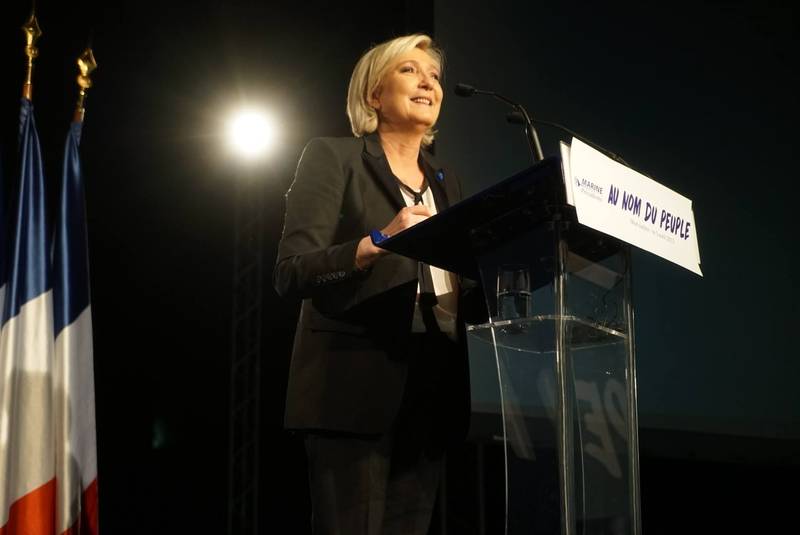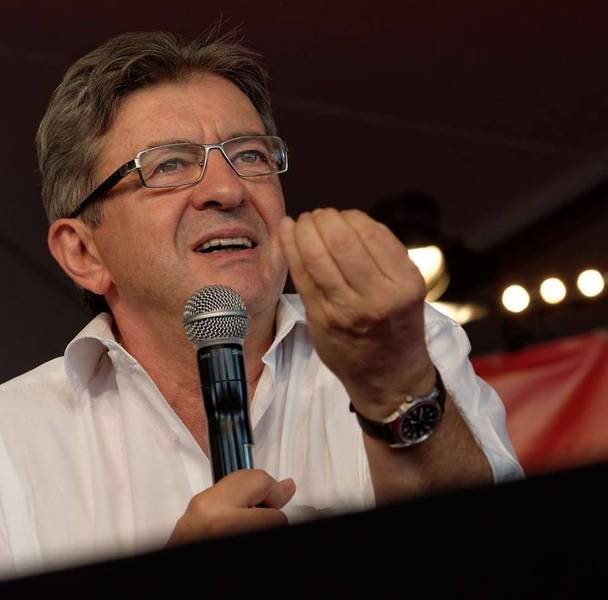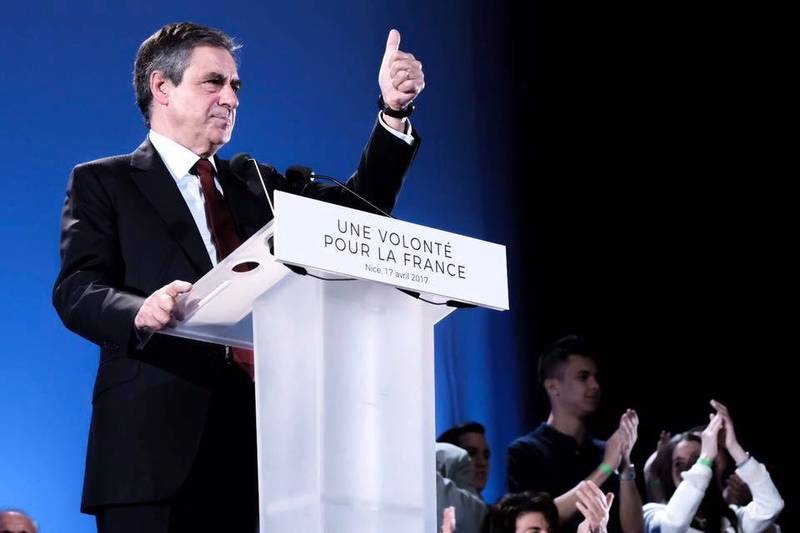France Chose Positive Rebellion Over Populist Revolution ... for Now
Adelina Marini, April 25, 2017

Marine Le Pen was supposed to be the anti-systemic player who gathers the anti-establishment protest vote, just like Geert Wilders was supposed to be in The Netherlands. Both of them, however, have been in politics long enough to expose the lack of substance in their platforms and leave some large space for new outsiders. In France this turned out to be Emmanuel Macron, who managed a positive rebellion against the system, finishing first in the first leg of the April 23 presidential elections with 24.01% of the votes without being a part of the political status quo. Closely following him is Marine Le Pen with 21.30% of the votes. There are several conclusions to be drawn from the France presidential elections: the answer to voter’s problems is not necessarily a leader, party, or ideology, which destroys; it is difficult for euroscepticism to win in inherently pro-European states; traditional parties in some states have lost their raison d'être; populism is losing steam.
The French engine of the EU is about to wake up
Of all electoral challenges in the last year, the elections in France and Germany are the most important ones, because the European idea itself was created by these two countries, called the EU twin engine. The European referendum in the UK was shattering, but it did not pose a serious tectonic risk to the European Union. After all, the Union was born without the UK, so it is not unthinkable to continue living without it. There are even signs that Britain's exit is having a healing and strengthening effect on the community. The EU can live without countries like Hungary, Bulgaria, even without Poland. It can swallow political cataclysms in countries such as The Netherlands or elsewhere, but a political revolution in France would disturb the balance in the Union, and therefore challenge its very existence.
During the government of Socialist François Hollande France lost a considerable amount of influence at the European scene. It became clear the very day he came to power, that there will no longer be the same symbiosis between Berlin and Paris like during the time of the Mercozy team, when German Chancellor Angela Merkel and French President Nikolas Sarkozy (both of them belonging to the same European political family – the EPP) set the agenda of the Union, especially in the difficult period of finding a solution to the euro area crisis. The two of them even established a tradition of giving joint press conferences following EU summits. With Hollande in the Élysée Palace the natural successor, Merkollande, did not happen. Despite that, in difficult times for the EU Mrs Merkel and Mr Hollande managed to get close enough to send an important message, which was the case of their joint appearance in the European Parliament, when the two of them spoke against the destructive power of euroscepticism and populism.
This did not help France one bit in standing side by side with the powerful Germany. Frustration against the indecisiveness of the French president to carry out long-postponed reforms was growing every single day throughout the EU, but mostly in Berlin, where the government was nervous about France's excessively high public debt, poor growth, and the constant need to make concessions on the rules agreed on after many sleepless European nights, that were not done for other countries. France is in the macroeconomic imbalances procedure almost from the very beginning of the reform of economic governance in the EU. Moreover, for another year, it is in the group with the worst economic imbalances, where it is keeping company with Bulgaria, Croatia, Italy, Portugal and Cyprus.
According to this year’s report of the European Commission on the macroeconomic imbalances procedure, France has a slow productivity growth, high public debt, and low competitiveness. Unemployment has started to decline compared to its peak of 10.4% in 2015, down to 10% in 2016, but long-term unemployment continues to grow, contrasting with the general tendencies in the EU. Unemployment among the young and low qualified continues to be high and has reached a share of 44.2% of total unemployment in the third quarter of 2016. According to the EC’s winter forecast, France’s economy is expected to grow by 1.4% this year and 1.7% next year.
The business environment in France is also not in an enviable position compared to major competitors. The regulatory burden continues to be very high, the tax burden is also among the highest in the EU. The implementation of the EC's country-specific recommendations of last year is rather unsatisfactory. Significant progress has been made in the reform of labour law (owed to Emmanuel Macron). No progress has been made in reforming the unemployment benefit system. Minor progress is being made to improve the vocational education and training system. The barriers in the service sector and the improvement of administrative, accounting and fiscal rules for companies are somewhat removed.

Not much has been achieved regarding the reduction of taxes on production and corporate tax either. The EC expects France to increase the efficiency of public spending and taxes, reform the minimum wage and the unemployment benefits system, and improve the education system and the business environment. If the next president of France is Emmanuel Macron, he will have to deal with all these problems to bring France back to its place in the EU. If it is Marine Le Pen, France will not have to come back because there will be a debate about its exit.
What was being offered on the French political market on April 23?
Following the major crisis in the euro area, there have been serious shifts on the political scene in many EU countries. Traditional or rather moderate parties retained their power in those countries where a quick solution to economic hardships was found. Ireland, which went through a short bailout programme, never managed to create an environment for populist and Eurosceptic parties; the Baltic States also managed to protect themselves from the populist epidemic, thanks to rapid and successful reforms, even before the 2009 crisis; in Spain, although an extreme left-wing populist movement has emerged, the traditional People's Party of Prime Minister Mariano Rajoy is again in power; in Germany, Angela Merkel continues to enjoy significant electoral support and the emergence of a new strong player on the left (but on the traditional political platform of the Social Democratic Party) represented by former European Parliament boss Martin Schulz, led to a shrinking electoral support for the populist and eurosceptic party Alternative for Germany (AfD).
Some traditional parties have won in the moderately eurosceptic Netherlands, but others are virtually on the brink of extinction. In the states where there were no guts for reforms and the economy still has problems, populism managed to make its way to the very top. In Italy, the anti-systemic party of comedian Beppe Grillo is in the lead in the polls. At these French elections, there was a choice offering of all that could be found on the European market – from the extreme left-wing to the ultra-right-wing. The four major competitors, who finished with very close results, are representative of all political fractions in the EU at the moment. Marine Le Pen’s National Front is the equivalent of the United Kingdom Independence Party (UKIP), led until recently by MEP Nigel Farage, to whom destroying the EU turned into a life’s mission. Le Pen’s language is very close to the one of the American President Donald Trump. In addition, she no longer hides her close relationship and financial dependence on Russian President Vladimir Putin.
The traditional political right’s candidate François Fillon ranked third on Sunday with 19.9% support. He is the equivalent of Viktor Orbán – conservative, with a favourable regard for Russia, eurosceptic to the same degree as the Hungarian prime minister. He almost dropped out from the race, for reasons of being entangled in corruption and other scandals. At this background, EPP’s support sounded rather awkward – again support for a leader with questionable reputation and a eurosceptic profile. Very close behind him – 19.6% - finished the fourth competitor in the race Jean-Luc Mélenchon. He is the mirror image of the Greek SYRIZA of Prime Minister Alexis Tsipras. A tone difference, which is more due to  circumstances, rather than differences in views, is that Mr Mélenchon is also strongly eurosceptic like Marine Le Pen.
circumstances, rather than differences in views, is that Mr Mélenchon is also strongly eurosceptic like Marine Le Pen.
Macron the reformist
Against this background, Emmanuel Macron’s result is a real surprise. The 39-year-old liberal rose to the French political scene after being promoted by François Hollande, who will be remembered in French and certainly in European history with his incredibly low 4% rating. Macron was appointed minister of economy in Mr Hollande's government, where he tried to launch some of the hardest and longest-postponed labour market reforms, which the EC has been pushing for years in its European semester reports. Once faced with a political wall, Macron decided to go on his own. He founded the En marche! movement a year ago and decided to stand alone in the presidential election.
Despite his short stay in government, he is in fact a new face, which does not appear with new ideas, however. Quite to the contrary. The Macron programme contains well-known pro-European and liberal views for open market, fiscal discipline, deepening of euro area integration, openness to migrants. Unlike Marine Le Pen, Emmanuel Macron has bet on the positive campaign. For the second round, he will be supported by most of the other political forces for the sole purpose of Le Pen not winning.
Part of the explanation for Macron's victory is that there is already a lot of information accumulated about populist and Eurosceptic movements after the series of elections in Europe and the United States. Nearly a year after the European referendum in the UK, it is already clear that the exit from the EU of a very poorly integrated member state is an extremely complex, labour-intensive and, above all, expensive task. The intelligent voter can imagine what the exit of one of the most integrated member states, who is co-author of the European project, would mean. Those struggling to leave have not yet presented the exit cost to voters, but looking at the other side of the English Channel, it can be predicted what France's future outside the euro area and the EU would look like, with its current economic performance.
Despite him receiving considerable support, many Frenchmen did not identify Jean-Luc Mélenchon with salvation. The SYRIZA experience in Greece lends enough answers to the question of how realistic Communist ideologies of the 20-th century are in today’s globalised and digitalised world, especially when you depend on the solidarity of the rest of the members of the club you are a part of. Regarding François Fillon, his recipes are already being implemented in Hungary and Poland and this brings them nothing good at this stage.
There is, however, the second round
Polls before the first round as well as the ones now suggest a convincing victory for Emmanuel Macron. Currently his lead on Marine Le Pen is 20% (+/-). According to French election history connoisseurs, the Le Pen family always fails at the second decisive round. Now it is different, however, and the stakes are much higher. Elections in France, as well as elsewhere, were subject to outside interference. It is part of Russia’s foreign policy to fight for the destabilisation of the European Union from the inside, so it supports ideologically or financially parties, which are fighting for exit from the EU. Marine Le Pen even made a demonstration of meeting Vladimir Putin in the Kremlin a little prior to the elections. Besides, French-language Russian media, owned by the Kremlin, led a ferocious propaganda war against Emmanuel Macron.

Support for Marine Le Pen was also extended by American President Donald Trump, who even during the election day allowed himself to send support Tweets. It is yet to be seen if outside interference will increase and to what degree can its influence significantly change current attitudes. Another unknown is the effect of the Paris terrorist attack right at the end of the campaign, responsibility for which was claimed by the terrorist organisation Islamic State. It is possible that this will remain a current subject for the second round as well. In the meantime, the EU is about to approve on April 29 its negotiation positions regarding the UK exit, which will additionally sober-up those, who trusted Le Pen because of other considerations, not because of her calls for leaving the EU.
Should Emmanuel Macron win, it will just bring some short-lived joy, for there are parliamentary elections upcoming in June. It is not yet clear what sort of parliament will he have to work with. His success depends largely on this.
The populist wave has revealed how interconnected member states are in the EU when elections are held in a systemically important country like France. Throughout Europe and around the world, everyone had their eyes fixed on France to see the outcome. The elections in France have shown something even more important as well - for the first time in 60 years there is no candidate from traditional parties in the second round. In this sense, the big European political families have to run a very serious diagnostic check, because the European elections (2019) are approaching, and they are no longer what they used to be - a dumping site for political waste or exile for the politically uncomfortable.
There are more and more politicians with serious political intentions entering the European Parliament. It was namely there that the star of Nigel Farage arose, who, lacking any political influence whatsoever in his home country, managed to drive it to exiting the EU. The unknown until recently at the German political scene Martin Schulz also entered German politics on a ticket from the European Parliament and is now threatening Angela Merkel’s victory at the elections this coming autumn. In Croatia, government was ceased by some of the most influential Croatian MEPs. This means that the ballots for the European Parliament elections will be ordered very carefully and with long-term vision in mind.
European political families are increasingly accumulating serious negatives because of tolerating national parties with a bad reputation or a frankly anti-European programme. This cannot continue forever, as it is obvious that voters are looking for solutions to specific problems, while instead they are often offered to choose between radical solutions such as leaving the EU or staying in, but with the same players. Thus, European political parties have to support their own members, which are part of the citizens' problem. The danger of populism will not go away until traditional parties are upgraded and adapt to the realities of the 21st century.
Translated by Stanimir Stoev